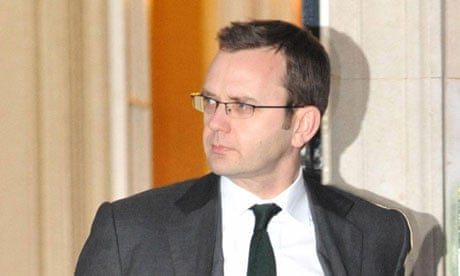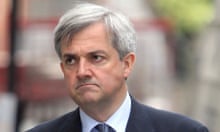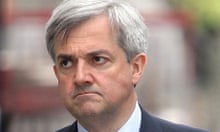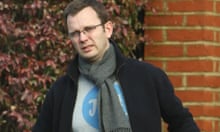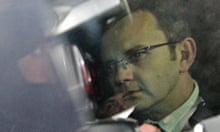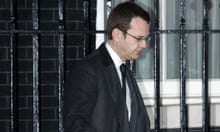The following apology was posted on 27 May 2011 and is to be published in the Observer on Sunday 29 May 2011:
"Secret tapes, Coulson's exit and the riddle of the story that won't go away" (In Focus, 23 January) reported claims from sources that – owing to a "growing drink problem" – former News of the World journalist Ray Chapman "started secretly taping conversations with his colleagues and editors", and that these tapes might assist in confirming allegations of phone hacking at the newspaper. Mr Chapman's widow has asked us to make clear that Mr Chapman was teetotal for the last 15 years of his life, and that she denies the existence of any such tapes. We apologise to Mrs Chapman for any distress caused.
Ray Chapman was a necessary cog in the News of the World reporting engine. His name was rarely in lights, but for several decades he worked behind the scenes, standing up the scoops that made his the best read tabloid newspaper in Britain.
His contacts were used to help bring in crucial information for hundreds of stories, most of which never featured his byline. But in his later years Chapman became worried, say friends. He was scrupulous in his attention to detail, but because of a growing drink problem struggled to remember conversations with colleagues.
So Chapman hit on an ingenious plan, according to a friend. He started secretly taping conversations with his colleagues and editors when they phoned him with instructions or called him over to their desk. That way, Chapman figured, he would always have a record of what was being said.
According to the friend, hundreds of tapes, made on a 122 Microcassette recorder, were kept by Chapman, providing an audio history of his time on the Sunday paper – mainly covering the period from 1998 to 2002 while it was run by Rebekah Brooks, now chief executive of News International, the Rupert Murdoch company that owns the News of the World, the Sun, the Times and the Sunday Times.
His actions may seem bizarre, but he was not unique. Several NoW journalists have told the Observer they taped conversations with their editors. "Lots of people did it," the ex-journalist explained. "It was a security policy in case anything went wrong and you ended up getting blamed."
To a media historian, the tapes might make fascinating listening. Chronicling a newsroom at full throttle, they could help shine a light on the complex dynamics that have helped make the News of the World a hugely successful newsgathering operation over the past two decades.
They could also be unintentionally hilarious. Heard the one about the assistant editor running a business from his desk importing vodka and other goods from eastern Europe? It's on the tapes.
More serious, though, is the question of whether the tapes could help confirm suspicions that phone hacking on the newspaper was endemic and sanctioned by senior journalists on the paper – including Andy Coulson, David Cameron's outgoing director of communications, rather than the action of one reporter over a brief period, as News International maintains.
Rumours about the tapes were circling for days before Coulson resigned on Friday. There is speculation, too, about emails exchanged between senior journalists. At least one senior Tory MP is known to have asked questions about the tapes. Several people inside News International are said to be hunting them. One thing is clear: whether they exist or not, rumours of their existence is feeding the increasing paranoia gripping Murdoch's empire.
Coulson is not the only one left bruised by his departure. His exit is bad news for the coalition. Several Liberal Democrats were quick to pay tribute to the way he worked, looking to build a consensus and not seeking to exploit political differences.
The fear among coalition MPs now is that whoever replaces Coulson may not be so keen on bridge-building. "Andy was never tribal," one Lib Dem said.
Inevitably his resignation – communicated to Cameron on Wednesday afternoon – triggered fresh questions about the prime minister's judgment. Labour claimed he should never have appointed someone with such a controversial past. But Cameron has shrugged off the criticism, praising Coulson as a "brilliant member of my team". Appointed by Cameron in 2007, when he was opposition leader, on the recommendation of George Osborne, Coulson gave edge to a media operation seen as lacking the kind of ruthless professionalism brought by Alastair Campbell to Tony Blair's office in the 1990s.
His departure smooths the way for the arrival of Murdoch, who is expected to visit London this week for crisis meetings with News International executives. The resignation will spark speculation about the influence the Murdoch empire had over the decision. Sources at No 10 were quick to pour cold water on claims that Coulson was in any way influenced by his former employer. Nevertheless, Coulson's decision to step out of the line of fire may offer News International some respite. Albeit briefly.
The letter, dated 4 January 2010, from Rebekah Brooks to parliament's culture, media and sport select committee, did not pull its punches. The committee had asked Brooks to supply some answers in response to its inquiry into phone hacking. Having declined the committee's request for her to appear in person, Brooks wrote: "You refer incorrectly to 'inappropriate action by News International journalists'. The issues giving rise to the committee's examination of various current and former News International and News of the World employees are specific to the News of the World and do not relate (as far as I am aware) to the other News International national newspapers any more than they do to any other national newspapers."
Brooks's point was not simply a semantic one. Throughout the phone-hacking allegations, News International's main PR strategy has been to contain the story. Whenever asked about the scandal, NI would say it was down to one rogue reporter, Clive Goodman, the paper's former royal correspondent, working off his own initiative in league with a private investigator, a former professional footballer, Glenn Mulcaire. Suggestions that others were involved were wide of the mark.
But as allegation after allegation surfaced suggesting a host of journalists and editors, from a junior named Ross Hall to the paper's assistant editor, Ian Edmondson, had been aware of the illegal practice, the PR strategy wore thin. The select committee wanted to know who in News International had sanctioned payoffs to Goodman and Mulcaire and why, given that the pair had been jailed for hacking into the phones of royal aides.
The committee's demands for lists of News International executives involved in the settlements came at a difficult time for Murdoch. News Corp, Murdoch's US-based media giant, which owns News International, was plotting to buy the remaining 61% of satellite broadcaster BSkyB that it does not already own in a £7.5bn deal.
When the news broke in June last year, rival media outlets – including Guardian Media Group, owner of this newspaper, cried foul, saying that a takeover would create a media group of unprecedented power. They pointed out that News Corp's titles account for a third of the UK's national newspaper circulation and that BSkyB is the largest broadcaster, with a turnover of £5.9bn (compared with the BBC's £4.8bn).
Suddenly the phone-hacking scandal assumed a new dynamic. Cultural commentators started to ask how, if phone hacking was widespread on a Murdoch newspaper, the government could allow News International's parent company to own even more of the UK media landscape?
They pointed out that the prime minister's director of communications was a Murdoch man, having risen up through the ranks of the News of the World to become its editor, and that the Sun had strongly supported the Tories at the last election. The suggestion that the Conservative-led government was unhealthily close to Murdoch lingered in people's minds.
City analysts thought little of the arguments against the deal, claiming it would do little to alter the plurality of the UK's media and that Murdoch effectively controlled BSkyB already.
The deal, which has already been approved by the European commission, is now in the hands of the culture secretary, Jeremy Hunt, who – before he was put in charge of the decision – had previously suggested it would not result in a "substantive change" in media plurality.
But at the end of last year the media watchdog, Ofcom, handed Hunt a private report that apparently suggests the decision be referred to the competition commission. Whatever he decides, an almighty row is almost certain.
When it was building its criminal case against Goodman and Mulcaire, Scotland Yard identified five people – in addition to the royal aides – whose phones were believed to have been hacked.
Only Mulcaire was charged, and pleaded guilty, to hacking the five other victims: PR guru Max Clifford, the head of the Professional Footballers' Association, Gordon Taylor, the supermodel Elle Macpherson, the MP Simon Hughes, and the sports agent Skylet Andrew. The police approached at least five other people, including a senior Labour politician and a reporter on a rival newspaper, with a view to using their evidence in the same case. But all five declined.
Why they did so is open to conjecture, but it is clear many people fear the Murdoch press. For politicians, such a fear is compounded by the fact Murdoch's newspapers can help swing elections. Significantly, not one current MP has launched civil proceedings against the newspaper, even though a number were informed by police that there was evidence their phones had been hacked.
But celebrities are different. A series of names, from the comedian Steve Coogan to the former footballer Paul Gascoigne, have launched civil proceedings. More revelations are likely, as other celebrities launch actions in the coming weeks. Nicola Phillips, a celebrity publicist is at the forefront of the legal actions. Whether she pursues her case or agrees an out-of-court settlement will be keenly scrutinised.
So, too, will be whether Edmondson, the News of the World's assistant editor, suspended over claims that the actress Sienna Miller's phone was hacked, will be served with separate legal actions from alleged victims, a financially crippling prospect.
Suggestions that Edmondson was going to "turn on" Coulson are categorically rejected by his lawyers. But the constant drip feed of negative stories that followed Edmondson's suspension was toxic not just for Coulson, who maintains he knew nothing about the phone hacking, but Fleet Street.
The Observer has learned that other newspapers could soon find themselves facing similar allegations. Documents released by the Met to lawyers bringing civil actions are being scrutinised to ascertain whether Mulcaire worked only for the News of the World. If not, the scandal is in danger of spreading.
The civil actions are embarrassing for Scotland Yard, which has been accused of failing in the way it has investigated the scandal. There is speculation that the phones of thousands of people were hacked into, raising questions about whether all the victims were informed by the Met. The Crown Prosecution Service is reviewing the evidence to see if there should be any further police investigation.
But culture select committee member Paul Farrelly said this was not enough: "We need an independent force outside the Met to investigate this."
According to a friend, Ray Chapman's tapes found their way to the offices of a London law firm. An associate of Chapman's went through them and decided they could be of value to those pursuing cases against the NoW. The source said lawyers who have heard the tapes made copies on to CDs and there are suggestions they may have been handed to police five months ago.
Today a Scotland Yard spokesman said he was unaware of the tapes' existence. But the Observer has heard from two people who claim to have listened to some of them. If their stories are true, it could mean yet more trouble for those in the Murdoch empire already exhausted by legal battles on so many fronts.
Not that Chapman will be around to witness it. He died on New Year's Eve 2007, just months into his retirement. "It was an open secret in the office that he made recordings," someone close to him said. "Everyone knew." It seems Chapman may yet bring in his greatest scoop. Posthumously.
